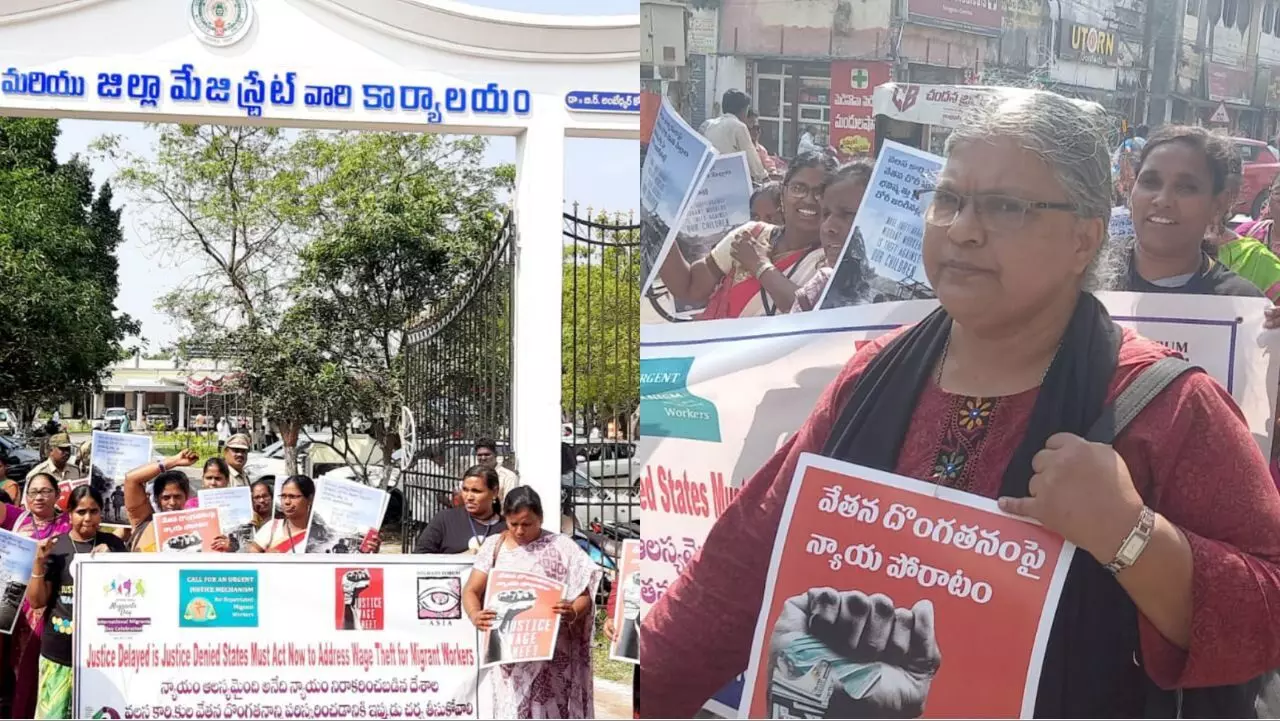A year on, AP migrant workers yet to receive wages from Middle East employers
The women who were offered jobs are from low-income groups, mostly uneducated, and migrate alone, leaving their families behind.
By Sri Lakshmi Muttevi
West Godavari: She could not bear the abusive conditions as a domestic worker in the Middle East. Desperate to return to her hometown, the woman had to pay Rs. 1 lakh to the agency. This is not the story of just one woman but the condition of thousands of women from Andhra Pradesh who travel to the Middle East to make a living.
Many women from Kadapa and East and West Godavari districts were sent back to their hometowns during the Covid-19 pandemic. They were told they would get their wages soon. It has been almost a year now and the women have not received their wages yet and have heard nothing from the agencies.
On Monday, the Andhra Domestic Workers Union represented the issue of wage theft to Dr. B.R. Ambedkar Konaseema district magistrate Himanshu Shukla. About 20 migrants who were victims of wage theft protested along with the National Workers Welfare Trust (NWWT) and later submitted a representation to the collector.
Agencies target poor, uneducated women
In Andhra Pradesh, many men and women from low-income groups migrate to other countries, especially the Middle East, for domestic and construction work. While there is Overseas Manpower Company Limited, a recruitment agency in Vijayawada, over the years, many unregistered agencies have come up. These agencies target women from low-income groups who come to their doorstep and offer jobs in other countries.
The women who were offered jobs are from low-income groups, mostly uneducated, and migrate alone, leaving their families behind. Unlike other countries, Middle East countries allow only migrant workers. Once there, these workers face many difficulties.
Unsolved deaths
In the last two-three years, the bodies of nearly 20 migrant workers were sent back to India. All deaths were due to health issues such as heart attacks. "In the majority of the cases, they are accidental deaths, but the report is covered up to skip financial assistance to their families," said Lissy Joseph of NWWT.
"There are many migrant workers who worked during the arrangements of the FIFA World Cup. While women were involved in cooking and cleaning jobs, men were in construction jobs. It is said that there are many migrant workers who couldn't survive due to climatic conditions, and a few were accidental deaths while at work," she added.
Return of migrant workers
According to Lissy Joseph, mobility restrictions and lack of employment opportunities during the Covid-19 pandemic demanded the countries of origin bring back their citizens, especially temporary labor migrants from destination countries. India, home of 9 million cross-border temporary labor migrants, carried out the largest repatriation exercise to bring back the stranded migrants. Even though the Indian government addressed the immediate requirement of repatriation, the government failed to understand and recognize their post-arrival grievances.
Amidst the establishment of grievance mechanisms such as MADAD and helplines in PBSK, the unresolved grievances remain high. The number of unresolved cases in the past years (2019 and 2020) is 6,988. This figure only includes Gulf countries except the UAE.
Wage theft
As per the assessment carried out by the Migrant Forum in Asia (MA), among the workers who lost their jobs, some were terminated and repatriated forcefully, some were given false promises about the payment of wages and dues, and only a handful of the workers received all benefits and dues before repatriation.
"The wage theft issue became widespread across all major migration corridors. From Andhra Pradesh, thousands of women were sent back and promised they would get their wages. They cannot contact the agency to get their wages back," said Lissy Joseph. As per the study, most of the wage theft cases reported by Indians were group cases committed by medium to large firms involved in construction, hospitality, manufacturing, and transportation.
"The victims of wage theft are confused whether to file a complaint at the destination or give preference to emergency repatriation. Many preferred the latter and traveled without any agreement or power of attorney submitted to the authorities or employer. The panic and lack of support to fight the case in the destination country also contributed to the poor access to grievance redressal mechanisms," she added.
In their representation, the association and migrant workers sought the government's support to help the migrant workers.
Demands
· Strengthen the platforms of cooperation for government and non-government stakeholders to retrieve unpaid wages and other benefits and coordinate the grievance redressal.
· Develop a standard labour contract for international migrants to reduce the violation of basic labour rights.
· Open up an online/offline multilingual platform for both current and returnee migrants to register their grievances, including grievances on wage theft during the pandemic.
· Create awareness among the migrants about the use of the digital platform to access various services of governments and other stakeholders.
· A specific multilingual platform for international migrants to register their grievances can be developed.
· The Indian government should sign bilateral agreements to protect the wages and benefits of migrants at their destination and ensure the portability of such benefits.